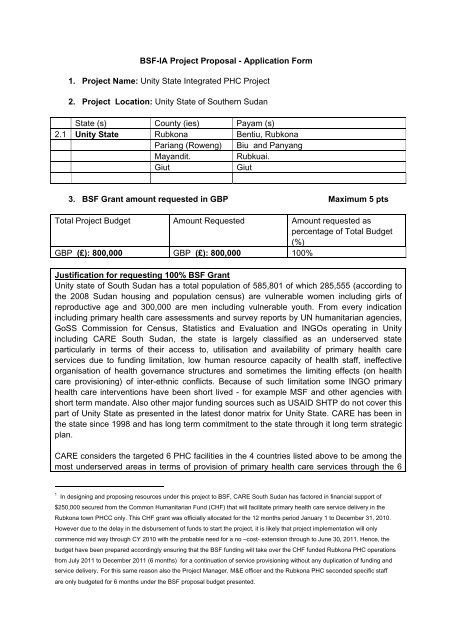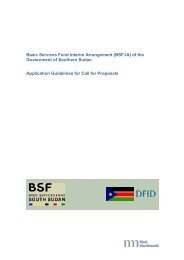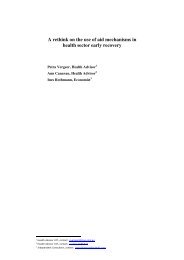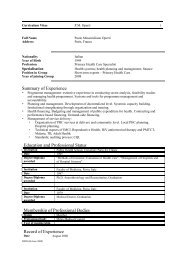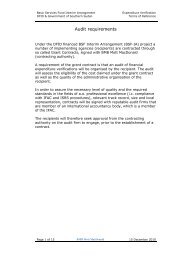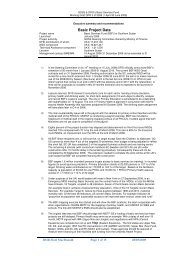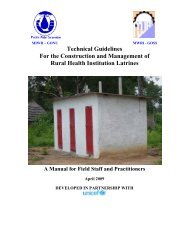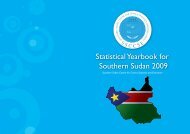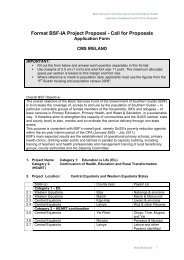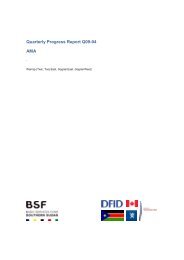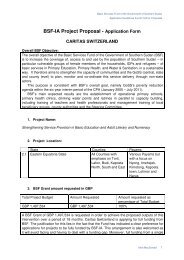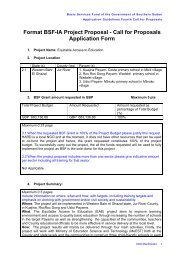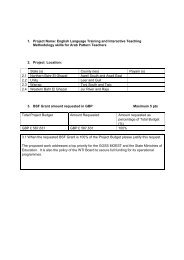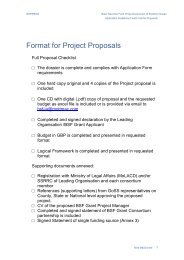CARE BSF-IA Proposal - Basic Services Fund SOUTH SUDAN
CARE BSF-IA Proposal - Basic Services Fund SOUTH SUDAN
CARE BSF-IA Proposal - Basic Services Fund SOUTH SUDAN
Create successful ePaper yourself
Turn your PDF publications into a flip-book with our unique Google optimized e-Paper software.
<strong>BSF</strong>-<strong>IA</strong> Project <strong>Proposal</strong> - Application Form1. Project Name: Unity State Integrated PHC Project2. Project Location: Unity State of Southern SudanState (s) County (ies) Payam (s)2.1 Unity State Rubkona Bentiu, RubkonaPariang (Roweng) Biu and PanyangMayandit.Rubkuai.GiutGiut3. <strong>BSF</strong> Grant amount requested in GBP Maximum 5 ptsTotal Project Budget Amount Requested Amount requested aspercentage of Total Budget(%)GBP (£): 800,000 GBP (£): 800,000 100%Justification for requesting 100% <strong>BSF</strong> GrantUnity state of South Sudan has a total population of 585,801 of which 285,555 (according tothe 2008 Sudan housing and population census) are vulnerable women including girls ofreproductive age and 300,000 are men including vulnerable youth. From every indicationincluding primary health care assessments and survey reports by UN humanitarian agencies,GoSS Commission for Census, Statistics and Evaluation and INGOs operating in Unityincluding <strong>CARE</strong> South Sudan, the state is largely classified as an underserved stateparticularly in terms of their access to, utilisation and availability of primary health careservices due to funding limitation, low human resource capacity of health staff, ineffectiveorganisation of health governance structures and sometimes the limiting effects (on healthcare provisioning) of inter-ethnic conflicts. Because of such limitation some INGO primaryhealth care interventions have been short lived - for example MSF and other agencies withshort term mandate. Also other major funding sources such as USAID SHTP do not cover thispart of Unity State as presented in the latest donor matrix for Unity State. <strong>CARE</strong> has been inthe state since 1998 and has long term commitment to the state through it long term strategicplan.<strong>CARE</strong> considers the targeted 6 PHC facilities in the 4 countries listed above to be among themost underserved areas in terms of provision of primary health care services through the 61In designing and proposing resources under this project to <strong>BSF</strong>, <strong>CARE</strong> South Sudan has factored in financial support of$250,000 secured from the Common Humanitarian <strong>Fund</strong> (CHF) that will facilitate primary health care service delivery in theRubkona town PHCC only. This CHF grant was officially allocated for the 12 months period January 1 to December 31, 2010.However due to the delay in the disbursement of funds to start the project, it is likely that project implementation will onlycommence mid way through CY 2010 with the probable need for a no –cost- extension through to June 30, 2011. Hence, thebudget have been prepared accordingly ensuring that the <strong>BSF</strong> funding will take over the CHF funded Rubkona PHC operationsfrom July 2011 to December 2011 (6 months) for a continuation of service provisioning without any duplication of funding andservice delivery. For this same reason also the Project Manager, M&E officer and the Rubkona PHC seconded specific staffare only budgeted for 6 months under the <strong>BSF</strong> proposal budget presented.
primary health care centres in those locations for which major support for primary health careservice delivery is almost non existent. As of July this year, there is no major secured fundingto continue with and carry out primary health care service provisioning in the targeted projectareas. With the 100% <strong>BSF</strong> funding, <strong>CARE</strong> will be able to build on, reach and increase itscoverage and support to the provision of health care services in the areas identified andtargeted for the implementation under this project particularly reaching out to more vulnerablerural women including adolescent girls of reproductive age and youth. This project will inparticular complement the limited funding provided to <strong>CARE</strong> South Sudan by the CHF 1 whichprovides only a restricted scope of support for primary health care in one health facility inRubkona county.4. Project Summary:This proposed project to the <strong>BSF</strong> will be implemented over the period July 1, 2010 toDecember 31, 2011 and will focus its implementation on working through and supportingprovision of essential primary health care services in 6 health facilities in four counties ofUnity State namely: Rukona; Pariang; Mayandit and Guit. This project therefore fills a criticalgap in coverage of health services that can neither be met by the State Ministry of Health(SMOH) or external organisations in a transitional state where returns are still ongoing andthere is likely increased need for basic services at a time of possible population movement asa result of post election clashes and the pending referendum in early 2011.This project will build on the existing productive collaboration between <strong>CARE</strong> South Sudanand SMOH, and has been developed with and continues to interface with state level plans ofthe SMOH with whom <strong>CARE</strong> has a documented MOU and long standing working relationship.The direct beneficiaries of this project are comprised of 164,404 returnees, IDPs andvulnerable local resident population, of which 90,422 are vulnerable women (including girls ofreproductive age) and 73,982 are men including vulnerable youth. Of the total directbeneficiaries 24,661 will be children under the age of five years (15% of direct beneficiaries)and 36,169 will be girls and women of reproductive age (22% of the direct beneficiaries). Theindirect beneficiaries will be 105,058, of which 50,281 will be rural women including girls ofreproductive age. There will be a particular focus on the targeting of rural women and girls ofreproductive age, under five children and youth who represent the most vulnerable segmentswithin the identified counties. <strong>CARE</strong>’s approach under this project will be based on extensiveprevious and ongoing studies of expressed community needs that will ensure inclusion of themost marginalised groups in primary health care decision making processes and communitylevel health governance structures to address inequalities in access to basic services.Specific areas of intervention under this project are consistent with the priorities of the <strong>BSF</strong>,GoSS and SMOH of Unity State and include:i. Continued provision of <strong>Basic</strong> Packages of health <strong>Services</strong> to vulnerable persons in theunderserved counties of Rubkona, Guit, Mayandit and Pariang.ii. Provision of in-service and formal training of SMOH and County Health Department (CHD)to build local capacity to sustain quality primary and reproductive health services. This willalso involves improving CHDs and SMOH personnel knowledge and capacity in gender,governance and conflict sensitivity approaches to health care planning and deliveryiii. Strengthening of SMOH, CHDs and community level supervision of health servicesincluding improved organisation and capacity building of community-level governancehealth structures.3
Relevance of USIPP to <strong>BSF</strong>’s overall objectivesThe objective and specific purpose of this project will directly contribute to the achievement ofthe overall objectives of the GoSS/ <strong>BSF</strong> through increasing the coverage of, access to anduse of basic health care services by vulnerable populations (of rural women, girl ofreproductive age and youth) in the targeted counties. This segment of the population,according to <strong>CARE</strong> South Sudan preliminary situational analysis and other analysis by the UN/ other international humanitarian actors are the most vulnerable and marginalised part of theoverall South Sudan population. Being one of the <strong>BSF</strong> priority sectors, this project willspecifically contribute to the primary health care sector by sustainably increasing access anduse of quality basic primary health care services as well as significantly strengthen communitybased health care delivery capacities (including that of the government) at State and Countylevels that are consistent with GoSS- <strong>BSF</strong>’s overall poverty reduction agenda within the sixyear interim period of the CPA (January 2005 – July 2011). The project will specifically worktowards the establishment of 6 well equipped and operational primary health clinics, buildingthe capacity of health professional and providing management training of local beneficiarygroups and state/county primary health authorities.Underserved / Priority Counties Targeted and Capacity of SMOHThe 2006 Government of Southern Sudan Ministry of Health Household Health Surveyidentified Unity State as a priority state for primary health care delivery in South Sudan. Thelast donor matrix from the Health Sector Lead also highlighted many counties in Unity Stateas lacking support for implementation of basic PHC services. Like some of the other states inthe South, health indicators for Unity State (child mortality rate, maternal health and diseaseprevalence) are very high - requiring urgent but comprehensive interventions by health aidagencies. Within Unity state, <strong>CARE</strong> will locate and implement this project in the followingunderserved and priority counties of Rubkona, Guit, Mayandit and Pariang that have minimaldonor attention and yet to be covered by the <strong>BSF</strong>. Below is a brief justification as to why thisproject is located in the targeted counties and specific Payams.Pariang County is bordering northern Sudan, a very fragile county that is receiving anincreasing numbers for returnees mostly women and children, the majority of which aresettling in Panyang Payam where there is a newly constructed PHCC and handed over by<strong>CARE</strong> to the County Health Department but requires additional financial support to ensurethat it effectively provides essential PHC services to serve vulnerable persons particularlyreturnee women, girls and youthIn Mayandit county, there are very few functioning health facilities, in poor condition andlacking basic equipments for providing quality services. Most facilities in the county lackskilled manpower in terms of health service delivery and particularly maternal care duringlabour, child birth and the post natal period. There are reports of the Swiss Red Cross pullingout of Mayandit county though the Sudanese Red Crescent has maintained that they havebasic funding to continue their operations in the county.In Rubkona county, the problems are similar to those of Mayandit but the former is expectedto benefit from a limited CHF funding through <strong>CARE</strong> that will officially end in December 2010with a possible no-cost –extension through to June 2011. Proposed <strong>BSF</strong> support to Rubkonais designed to augment the limited scope of the CHF funding to that county. The Guit countyhealth facility targeted under this application is almost non functional due to lack of fundingand in ability of CHD / SMOH to operationalise it.5
Globally speaking, the SMOH and CHDs lack capacity and resources in terms ofinfrastructure, logistics and man power making it difficult for the SMOH to sustain theirservices. As a result the centres run by the SMOH do not have adequate facilities that meeteven GoSS standards; they lack drug supplies and effective management. This projecttherefore fills a critical gap in coverage of health services that can neither be met by theSMOH or external organisations in a transitional state where returns are still ongoing andthere is likely increased need for basic services at a time of possible population movement asa result of post election clashes and the pending referendum in early 2011The specific needs and constraints of the target groups and beneficiariesAs already indicated in this application, the USIPP will generally target vulnerable returnees,IDPs and host communities in targeted counties of Rubkona, Guit, Mayandit and Pariang.Particular attention with be paid to the inclusion of women, girls of reproductive age andyouths. Though <strong>CARE</strong> will work with SMOH and CHDs as partners in the implementation ofthis project – SMOH and CHDs will also be targeted for capacity building and managementtrainings for reasons of their low capacity. In general, Unity State and particularly the abovecounties experience seasonal shifts that impact heavily on any planned activities. The wetseason commences between May and July every year.Many of the target groups and beneficiaries are not able to access the facilities due todistance and also in most cases seasonal flooding may further restrict access to health carefacilities at particular times of the year. In addition, the targeted counties are expected toreceive a large number of returnees over the next few years that could negatively impact onthe quality and availability of health services if their capacity is not improved. Preventablevector-borne and parasitic diseases are endemic, with malaria and diarrhoea diseases beingthe two leading causes for morbidity and mortality. Most health problems are caused by poorhygiene and sanitation, frequent episodes of diarrhoea, malaria and intestinal parasitesleading to chronic malnutrition, particularly among children less than 5 years of age. This inturn compromises resistance to infection, creating a vicious cycle of malnutrition and infection.There are very limited trained midwives in the proposed project areas, and althoughtraditional birth attendants have been filling a void in maternal health care, they have not hada significant impact on maternal morbidity and mortality. In the short-term, maternal morbidityand mortality could be greatly reduced with improvements in number of women regularlyattending ante-natal visits, an increase in intermittent prophylactic treatment of malaria, anincrease in vaccinations, the further training of midwives, increasing the number of womenwho deliver with the assistance of trained health workers, and the early identification andearly referral of pregnant women at risk to deliver in PHCCs.Extent to which women and girls will be targetedAs of December 2009, <strong>CARE</strong> South Sudan completed its five year strategic plan for itsprogramming in South Sudan. The strategic plan covers a period of January 2010 toDecember 2014, and identified 2 Impact Groups as the focus for programming in SouthSudan over the next 5 years (i) vulnerable rural women and girls of reproductive age and (ii)marginalized and vulnerable rural male youth aged 14 to 35 years. Therefore working withand through women and girls to reduce poverty and social injustice is a must for everyfunding <strong>CARE</strong> South Sudan is soliciting including the <strong>BSF</strong>, under this application. <strong>CARE</strong> iscommitted to encouraging and supporting women to take an active role in the planning,implementation and monitoring of project activities at all levels. To overcome the social andcultural barriers that are currently undermining women’s effective participation in health6
service planning, management and provision, <strong>CARE</strong> has a strategy for increasing women’sparticipation in the provision of health services by ensuring their active involvement andparticipation in project decision making structures and empowerment through trainings.Improving women’s participation in the provision, management and prioritization of healthservices will ensure that services available meet women’s needs, encourage health seekingbehavior amongst women, and will positively impact on the overall health of communities.CHDs and village health Committees will be sensitized on the need to include women and<strong>CARE</strong> will work with the SMOH / CHD to ensure the health services reflect women’s priorities;and women will be regularly consulted as to the quality and scope of services available. Inaddition, a women federation group has been identified and will be working with <strong>CARE</strong> indisseminating hygiene promotion messages including general sensitization of the communityand will be targeted for training. Of the total 164,404 direct project beneficiaries, 90,422 willbe vulnerable rural women including girls of reproductive age and 73,982 will be men(including vulnerable youth).7. Description of activities per result and sub sector: Maximum 5 ptsThe project activity work plan is attached in Annex 4 of this proposal. Below is a detaileddescription of activities to be implemented per result and or sub sector area as shown below:1. <strong>Basic</strong> Curative <strong>Services</strong>.a. Consultations: The Project will be conducting Out patient curative services. Theconsultations will be conducted by Medical assistants or Clinical officers. The severecases identified will be referred to higher levels (hospital) for management.b. Laboratory services: 2 PHCCs will provide laboratory service to conduct basiclaboratory investigation. Other four PHCCs will conduct rapid diagnosed test e.g. Paracheck for malaria, Haemoglobin, estimations and urine for sugar and acetones.c. Disease surveillance: All 6 facilities will be providing weekly and monthly reports andeach facility has a trained focal point person responsible for disease surveillance.Hence the disease target by GOSS MOH for surveillance will be put undersurveillance at the Project health facilities. The project will monitor emergencysituations and will have buffer stocks of emergency supplies prepositioned at theproject site to deal with any emergency.2. Immunization: The Project will give immunization a high priority in order to increaseroutine coverage from 50% to at least 80% in the areas that are covered by theProject. The immunization activities will include:a. Routine Immunizations: This will be conducted daily at the PHCCs. All childrenbrought to the health facilities will undergo immunization screening before receivingany health service. The only exception will be the severely ill children who may needimmediate attention.b. Out reach immunization: The project EPI vaccinators will conduct schedule outreachvaccination within the catchment area of the PHCC. This will reduce the defaulters’rate and ensure that no children miss immunization doses.c. General campaigns. Project staff will participate in all SMoH and WHO/UNICEF Polio/Measles campaigns planned during the Project period.3. Health Education. This will remain the core activity of the project. The Project staffand community health promoters will conduct health educations through followingmeans:a. In Health Facilities. This targets all beneficiaries attending any service at the Healthfacilities. It is conducted by community health Promoters (CHP) on daily basis in themorning before the beneficiaries receive their intended services.b. Home visits. This will be conducted by the Project Community Health promoters.7
They will visit the community and deliver health educational messages based onparticular house hold situation and give advice accordingly. The CHPs will also referthe sick; children missing immunizations, pregnant women not attend ANC etc to thefacilities.c. FM radio broadcasts: The project will broadcast specific Health messages overBentiu FM radio which will be received by all listeners throughout the state.d. Peer group sessions: Special Health education will be provided to special group e.g.Teachers and Pupils regarding bilharzia disease which is very high has veryprevalent rate among the school children.4. Reproductive Health (RH).a. Ante Natal Care: The project objective is to reach 80% of the pregnant women andprovide ANC services. The services will include but not limited to the following:b. provision of iron supplementation,c. Provision of Anti Malaria prophylaxis,d. Promotion iodine salts intake by pregnant women.e. Safe deliveries: All PHCCs will be providing normal vaginal deliveries and post natalservices.f. Family Planning: The project will run Family Planning clinic in Rubkona and theHealth Visitor (HV) will conduct regular field visits to the other PHCCs so that thewomen who require FP services can especially the lactating mothers have access tothe services.g. Reproductive Health education. Like everywhere in South Sudan, RH knowledge isvery low among the community particularly men. Hence the Project will conduct RHawareness campaigns so that the community gain the knowledge and participate/facilitate referral of Obstetric emergencies.5. Capacity Building.The propose project will not only intensify capacity building trainings for the SMOH staff at alllevels of State Ministry, provide essential drugs and equipment and rehabilitate 3 healthfacilities in Bentiu, Biu, Panyang and Rubkuai Payams within the 4 targeted counties, but willalso pay secondment allowances to SMOH / CHD staffs, provide 3 motor bikes to 3 out of the4 targeted CHD managers to facilitate planning and health care supervision. The project willalso require a vehicle to facilitate joint and rapid surveillance, supervision and monitoring ofproject initiatives at all levels. The project capacity building efforts will also be directed to theestablishment and skill training of 6 Village Health Committees on themes including basichealth care governance, gender and conflict sensitivity leading to the understanding of keyconcepts on the underlying causes of poverty and vulnerability in South Sudan.The Project will provide essential equipment, medical supplies and undertake specifically forthe rehabilitation of the three PHCCs (of Bentiu, Biu and Rubkuai).General Outputsi. A total of 6 primary health care centres established, supported and operational providingsustainable access to basic quality health care services by 164,404 vulnerable segmentsof the population including women and girls.ii. 3 primary health care facilities rehabilitated in Bentiu, Biu and Rukuai of the 6 targetedfacilities.iii. <strong>Basic</strong> curative and laboratory services are established and active disease surveillancesystems is in place.iv. Daily routine immunizations are availed in PHCCs; Scheduled monthly out reachimmunizations are conducted and Project vaccinators actively participate in generalcampaigns.v. Ante Natal Care (ANC) services are provided to pregnant women; Deliveries are managed8
y trained personnel and Lactating mothers utilize Family Planning method.vi. Technical and managerial skills trainings are conducted for primary health providers andmanagers. Awareness building and training on the core cross cutting themes of gender,governance and conflict sensitivity conducted.vii. Intensive Health Education at the levels of the 6 PHC facilities, community; and media areconducted.SPECIFIC TARGETS1. 90% of the beneficiaries receive basic quality health care services.2. Weekly; monthly reports are produced to monitor any disease outbreak.3. Routine immunization coverage of children under one year increased from 50% to70% in 1st 12 months of the project and to 80% at the end of the project.4. 80% of under five (5) children received Vitamin A.5. TT2+ coverage of women attending ANC increased to 80%.6. 60% of the estimated pregnant women attend ANC.7. 50% of the deliveries are conducted by trained personnel8. 15% of the lactating mothers utilize modern Family Planning methods.9. 16 training sessions are conducted - including case management skills, universalprevention, basic emergency obstetric care, health governance, gender and conflictsensitivity and health management information system.10. 180 staffs, largely community based health care providers and managers trained.11. 3 health facilities rehabilitated to Goss-<strong>BSF</strong> standards using <strong>BSF</strong> funding.12. A total of 6 health facilities (including the 3 rehabilitated) are equipped and functional13. For all the targeted 6 facilities, 60% availability of essential drugs throughout theproject cycle.14. 80% of the health facilities staffs have knowledge of health management informationsystem and all health facilities produce regular reports within deadlines.8. Methodology: Maximum 35 pts<strong>CARE</strong>’s Program Approach & how the <strong>BSF</strong> Project fits in<strong>CARE</strong> South Sudan’s multi-year strategic plan focuses on the programme approach ratherthan the project approach using key pathways (such as health, water/sanitation andlivelihoods) with emphasis on a holistic integrated approach that focuses on the samevulnerable populations over the long term within specific targeted areas for poverty reductionand eradication of social injustice wherever <strong>CARE</strong> works. This proposed project initiative willbe located in the Unity State Program Area where <strong>CARE</strong> is implementing livelihood securityinitiatives and previously similar health projects and its outputs are expected to fit well withinthat framework of the program approach. The <strong>BSF</strong> project will build on previous and ongoingefforts of <strong>CARE</strong> in Unity State that consolidate project gains for a larger programmatic impactat the beneficiary level based on lessons learned.Specific USIPP Project Management and Implementation PlanThis project will not be implemented under a consortium function or arrangement with localNGOs as <strong>CARE</strong> Bentiu is at the rudimentary stages of identifying, screening and selection ofpermanent local civil society partners for its Unity State Program Area. That said <strong>CARE</strong> hasbeen working closely with the Unity SMOH and respective CHDs in health care delivery for9
several years now thus have built a very strong and productive working relationship that willbe used and form the basis for the implementation of this project.The Project will be implemented by various categories of qualified and certified healthpersonnel. A total of 95 staff (including those to be seconded from SMoH) are needed toimplement the health service delivery program in the 5 mentioned locations. Most of the staffwill be seconded from the SMOH, while <strong>CARE</strong> will hire professional health staff to fill the gapsthat SMoH can not fill. The SMOH staff will receive incentives from <strong>CARE</strong> while their salariesand other benefits will be paid by the SMoH. <strong>CARE</strong> will build the capacity of the SMoH staffthrough training in technical health areas as well as on community participation.The strategy of implementation will involve partnerships with state ministry of health at itsvarious levels. The County/ Payam authorize and the beneficiaries will actively participate todevelop sense of ownership and sustainability of the services. The project will alwayscollaborate with UN agencies and INGO actors on ground to ensure collaborative approachand avoid duplication of interventions.Collaboration and Partnerships with State Government and County Health Actorsa). With State Ministry of Health:<strong>CARE</strong> will work and coordinate with the SMOH in the implementation of the project throughout the project cycle. However <strong>CARE</strong> will provide technical support (in form of skills trainingsand supply of medical drugs and equipment or supplies) to the health facilities. Meanwhile theSMoH will provide the most of the health providers i.e. nurses, mid wives, vaccinators,medical assistants/ clinical officers, laboratory attendants and pay their monthly salaries andbenefits pays incentives to the SMoH staff. The management of the health facilities will be theSMOH with <strong>CARE</strong> providing the necessary the necessary technical and capacity buildingsupport. Both parties will conduct joint supervision for project activities to ensure ownershipand responsibly for the SMOH. <strong>CARE</strong> will actively attend, participate and contribute in healthcoordinating meetings organized by the SMOH. Hence <strong>CARE</strong> will work closely with the StateMinistry of Health as per stipulated policies. The project will involve the SMOH in all theactivities and liaises with the ministry during capacity building activities to ensure the rightpeople are trained. The interaction on this project, roles and responsibilities will be clearlydefine and revisited during the launching of the project at state level. As has been the case inthe past, <strong>CARE</strong> will implement the proposed <strong>BSF</strong> project based on a memoranda ofUnderstanding signed with the SMOH that stipulates roles and responsibilities of both partiesand which will ensure that <strong>BSF</strong> support to health in Unity State is integrated into state levelplans for the SMOH which in turn link with national policy and priorities for the GoSS.b). County Health Departments<strong>CARE</strong> will work in closely also with the 6 County Health Departments particularly at the 6service delivery points identified for health service provisioning. The role of the project will beto strengthen the capacity of the CHD staffs through building improved management andsupervisory skill to enable them takeover the management of these health facilities at the endof the project. The CHDs will on their part crucially link the project to the village healthcommittees to increase awareness of the communities to create demand of the community toutilize the available primary health services. The CHDs will basically serve as the linkbetween <strong>CARE</strong> and the targeted communities helping with context analysis to identify andsupport the different needs of the different targeted beneficiaries. CHD staffs will also play akey role in participatory M&E particularly around the 6 health facilities supported by thisproject.c). Community Health CommitteesThe project will in collaboration with the CHDs mobilize the communities, to form or10
estructure existing community based committees (village health committees) which willinclude women, girls and youth and all categories of the community in the targeted locationsto actively participate in the project implementation activities. The major roles of thecommittees will be increasing awareness on: hygiene promotion, reproductive health;endemic diseases prevention and control, and referral systems at the community level.The community based health committees will also undergo training in order to deliver effectiveresults and services including M&E and the provision of crucial feedback on projectimplementationCollaborations and coordination with the UN agencies and INGOs.<strong>CARE</strong> South Sudan contributes to and is a participant in various coordination activitiesundertaken by the Sector Lead for Health. This has included regular supply of information onthe contribution of <strong>CARE</strong> activities in the health sector and provision of other coordinationinformation. Results of the proposed <strong>BSF</strong> project will be fed into the same coordinationmechanism. More specific coordination mechanisms include:i). UNICEF.<strong>CARE</strong> wills collaborate with UNICEF for the supplies of vaccines through the SMOH as wellas HIV /AIDS activities in the projectii). UNFPA.To achieve the above RH activities <strong>CARE</strong> will collaborate with UNFPA, and SMoH to securesupplies of Reproductive health kits and RH training materials.iii). NGOs.<strong>CARE</strong> will implement the project directly but will work closely with other partners andstakeholders implementing health programs such as WHO and other INGOs.iv). SSRRC.The project will share information related to activities, locations and the targetedbeneficiaries of the project with SSRRC. <strong>CARE</strong> will be an active member in general monthlyNGO coordination meetings and Health sector coordination meetings organized by SSRRCat the program area level.Project Surveillance, Monitoring & Evaluation<strong>CARE</strong> South Sudan will establish a robust filed surveillance, monitoring and evaluationsystem for the project through its already well established Program Quality and Learning Unit(PQL) based in Juba after a detailed baseline survey that identify and re-confirm benchmarkindicators to be measured during and after project implementation. This will also cover bothprogram and financial monitoring to ensure that activities in the project work plan reconcilewith the budget allocations outlined in the project proposal.The M&E activities will be under direct supervision of the <strong>CARE</strong> South Sudan ProgramQuality and Learning Coordinator who will pay regular field visit to ensure that the designedproject M&E system is implemented in accordance to the objectives and activities spelt in theproject proposal including the expected quality results. The PQL will work closely with theproject M&E officer (to be 100% reassigned from an outgoing health project) also to ensurethat project M&E is in line with <strong>BSF</strong> policy as well as that of <strong>CARE</strong> international evaluationpolicy and standards. M&E will be participatory with the aim of also building SMOH andcounty health staff capacity in surveillance, monitoring and evaluation. <strong>CARE</strong> also expectsproject site visits from <strong>BSF</strong> representatives to enhance project implementation throughsuggestions and further input into the project. A final external project evaluation will beconducted to determine project relevance, effectiveness, efficiency and sustainability by hiringan external evaluator to work with community based enumerators to assess the achievements11
and weaknesses of the projects.Some participatory M&E Tools to be used.The tools and techniques to be used for monitoring and evaluation of this project to bediscussed and finalised with (SMOH, CHDs and CHC) will be:- M&E plan. This will define relevant valid data to be collected, analyzed by who, when andwho to disseminate to.- Monitoring visits to service delivery areas using health facility checklist to ensure theessential equipment and supplies are in place.- Observations of case managements to assess the practical shills of the service providers.- Conduction of user (beneficiary) exit interview.- Regular monthly (at health facility level) and quarterly (at project level) with staff andpartner review meetings of the progress of implementation of project plan against thetargets as well as discussions on identified challenges and remedial solutions.- Financial Monitoring. This focuses expenditures: Actual against budget. This will examinedthe project activities against approved budget and the actual expenditures. The project willalso undergo midi term internal audit and final external audit and evaluation at the end ofthe project- Continuous monitoring will be conducted using designed formats and checklist.- Field Visits including spot checks, focus group discussions and key informant interviewson project progress and challenges: The monitoring and evaluation officer will conductscheduled visits to all centres. Project staff will collect raw activities data from the PHCCson regular basis (weekly, monthly and quarterly). The information collected will be analysedat the project and shared with the relevant partners. The results will be used to improveproject and inform decision-making- Community beneficiary feedback mechanisms- The Program Quality and Learning Advisor based in Juba will be conducting regular visitsto the project locations and will continue to provide direction and support to the field staff- Half-yearly M&E reflection sessions with the SMOH, CHDs and the communityrepresentatives to be facilitated by <strong>CARE</strong>’s program quality and learning coordinator.- Final external evaluation.General Training PlanUnder this project <strong>CARE</strong> in collaboration with the SMOH and CHDs will plan for and execute3 broad categories of trainings. These trainings will be targeted at 180 health staff drawnfrom SMOH, CHDs and the 6 village health committees representatives as described belowPrimary health care technical skills trainingThis will include refresher trainings in practical nursing skills, basic emergency obstetric care,universal precaution, clinical case management (STI syndromic treatment, IntegratedManagement Childhood Illness, new treatment protocols for malaria), EPI, and basicmidwifery refresher training for TBAsPrimary health care management trainingThis training will primarily be targeted at health care managers. The trainings will focus ongeneral managerial skills in primary health care facility, human resources and informationsystem management. The training will include Health Management Information System(HMIS), basic computer skills and human resources management.12
Gender mainstreaming, health Governance strengthening and conflict sensitivity cross cuttingthemesThe above three theme are core to the implementation of this project. Given <strong>BSF</strong> and <strong>CARE</strong>’sfocus on gender, conflict and governance, the project will ensure sensitivity to genderobjectives, activities and results as well as implement and institute basic governance systemsfor the implementation of the project. Conflict sensitivity awareness raising will be done for allparticipating government health staff to help raise their awareness on the ongoing intertribalconflicts in the counties with a view of minimizing its effects on the project. The three crosscutting themes will help facilitate inclusion and participation of vulnerable groups as well asfacilitate peace building leading to long term stability and peace. Government health ministrystaff will be trained on the 3 core cross-cutting themes and the project will ensure activeparticipation of vulnerable groups like women and youths in project implementation beginningwith the recruitment of mixed staff of men and women to make decision and implement theproject. <strong>CARE</strong> will attempt to link the above core issues to the underlying causes of povertyand vulnerability in the Unity State program area.Project Exit Strategy including handing over to SMOHAs a key sustainability factor, <strong>CARE</strong> will use experience gained in the implementation andclosure of similar health care delivery projects to successfully operationalise, phase-out, andhand over the project results, outputs and outcomes to the government through the SMOHand beneficiary communities as contextually demanded by policy and law. The project exitstrategy will be fully discussed during the project start-up phase with all project stakeholdersprior to full implementation. Key elements of the strategy will include;- Clear definition of roles and responsibilities of all engaging project stakeholders both duringand after the life of the project in line with SMOH and GoSS –<strong>BSF</strong> policies on exit strategyincluding development of MOU with SMOH outlining phases of hand over.- Management training and thematic capacity building on key aspects of sustainability andtaking-over- Stakeholder (particularly vulnerable group participation in the identification of possible postproject scenarios and a discussion on the likely community intervention(s) that enhancesfinancial and technical project continuity and sustainability.- Linkages with other health care service delivery organisations and charities includingpossible handling over to local NGOs.- advocacy work by <strong>CARE</strong> on issues pertaining to sustainability of health services at state andcounty level e.g. contributing input to policy measures on improved efficiency of drug supplyand assumption of salary payments to SMOH staff.This will be finalised during project start-up period after series of discussions with all engagingstakeholders and same issues revisited towards the end of the project in December 2011.Project Inputs Procurement<strong>CARE</strong> has an effective and sound procurement policy -procedures of which will be followedfor the procurement of all project inputs including medical equipment and supplies, and healthfacility rehabilitation materials in line with the <strong>BSF</strong> procurement regulations and policies aswell. The supplies and rehabilitation materials can be sourced from local Markets, Overseas& Regional Markets by an already established Procurement Committee. <strong>CARE</strong> South Sudanprocurement manual will be provided to <strong>BSF</strong> at anytime upon request.Project Assets Management.All assets procured under the <strong>BSF</strong> funding will be managed in line with the <strong>CARE</strong> and <strong>BSF</strong>asset management manual and policies to ensure security of assets, effective use and13
contribution to the attainment of the over all objective of the project.Proposed Full Team For Project Implementation.The key positions and functions within and supporting this project and budgeted for are asfollows:StatusCountryDirector of<strong>CARE</strong> SomaliaSouth Sudan(10%)InternationalAssistantCountryDirector.Program (10%)InternationalProgram Qualityand LearningCoordinator(PQLC) (30%)International<strong>CARE</strong> SomaliaSouth SudanSafety andSecurity Adviser(10%)internationalOther Jubabased projectsupport staffProject Manager(100%)National.Major responsibilities ( Functions)This position provides overall leadership to the <strong>CARE</strong> South Sudanprogram performs an important liaison function with donors andensures that programs in southern Sudan are aligned with UN/GoSSpriorities and policies related to both programming and programsupport- total charged to the project.This position will be overall responsible for providing strategic andprogrammatic guidance to the <strong>BSF</strong> project. The ACD will ensure thatoptimal technical support is provided to the <strong>BSF</strong> project and willperform a key representational role in liaising with the <strong>BSF</strong> office inJuba and in making sure that this State level health activity isintegrated in the overall UN/GoSS Working Plan for health in southernSudanThis position will ensure that robust monitoring and evaluationsystems are established to measure baseline, ongoing and finalresults of the project. The PQLC will work closely with the projectmanager and M&E officer to develop cutting-edge monitoring systemsdesigned to collect information that will provide a clear impression ofthe impact of the <strong>CARE</strong> Health project within the context of otherongoing <strong>CARE</strong>/external initiatives providing humanitarian assistancein Unity StateWill surveillance plan and monitor the security situation of staff andassets of the project in the targeted area in line with <strong>CARE</strong> SS safetyand security plan, thus providing regular early warning information onsecurity for informed project implementation decision making.<strong>CARE</strong> South Sudan Juba-based program support team (10% of salaryof each of the <strong>CARE</strong> Juba based support staff will be charged to theproject and comprising of: 1) 1x Finance and Administration Officer, 2)1x Procurement Officer, 3) 1 procurement and logistics assistants, 4)1 x Driver/Technician, 5) 1 X Human Resources Officer, 6) 1 X Risk &Grants Manager, 7) 1 X Admin Supervisor, 8) 1 X Finance & AssetController, 9) 1 X Liaison Officer. These staff will be responsible formanagement of payroll, procurement, managing service contracts,financial and financial risk management, production of financial reportsand other in-country direct support services. These staff directlysupports field implementation activities- total charged to the project.Oversee all aspects of project implementation including planning,implementation, reporting, training, coordination, monitoring andevaluation. The Project Manager will also be responsible for liaison14
with the project stakeholders and financial management.Monitoring andEvaluationOfficer (100%)MedicalAssistants(100%)HealthVisitor/Midwife.(100%)Nurse /Pharmacist(incentivesseconded stafffrom SMoH)EPI Technician/Vaccinator(incentivesseconded stafffrom SMoH)LaboratoryTechnicians(100%)S/he implements and consolidates the Management InformationSystems to keep project records, track impact of activities and informsproject management on possible course of action. (S) He will scheduleand implement continuous assessments, evaluations, and KAPsurveys.The MAs performs the over all management of the PHC centre.He/she ensure that all the services are running on day to day. The MAgenerates PHCC reports on all the activities in the PHCC. He/Sheprovide support to the nurse to ensure adequate drug supply to thecentre. S/he ensures referral of very sick patients to hospital.Implement the reproductive health program in collaboration withSMOH office. She set up family planning clinics in two health facilities.Identify staff training needs in RH and provides on job training (OJT)to midwives in the health facilities as well as SMOH RH staff. Shesupports and supervises midwives to that universal precautions areobserved. The health visitor participates in the collection and analysisof RH data from the facilities and writes weekly and monthly reportsMC.Manage the day to day activities in the pharmacy. Dispensemedications as prescribed by Doctor, GMT or Medical Assistant incharge of the consultation room. Advices patients /care taker onproper use of medications. He/ She ensure availability of drugs stocksin the pharmacy all the time. Conducts a regular check for any expireddrugs in the pharmacy.Screen all children under five for immunization at the PHCC. S/hemanages the cold chain at the clinic and ensures enough vaccines/antigens in the cold chain. Vaccinate all children who seek anyservices at the health centre and advise care takers about the differentside effects of vaccines and return dates. Participate in schedulednational immunization programs. Keeps immunization records of allchildren vaccinated at the centre and compile the EPI report for thecentre and give the report to the PHCC supervisor.The Laboratory Technician is responsible for the overall managementof the lab. Lab Tech conducts all basic medical investigations andensures safe environment for both the patient and staff.He therefore ensures the availability of adequate laboratory reagents,apparatus and supplies in the Lab. He/She observes proper disposalof needles, syringes, lancets and sample bottles of stool, urine,sputum, or blood. Maintain records of all patients attended in the Laband report disease any potential disease out brakes from thespecimen results15
Mechanic/Driver(100%).Admin Assistant(100%).Drive <strong>CARE</strong> vehicle to all approved destinations and carrying onlyauthorized passengers while maintaining care and safety of both thepassengers and the vehicle. Ensures vehicle movement authorizationis obtained and the vehicles daily operation log sheets are filledcorrectly prior to departure and after every trip; Log official trips, dailymileage, gas consumption, oil changes and greasing. Keeps regularradio contact with the base radio when ever on long trips. Ensure<strong>CARE</strong> vehicles comply with local transport regulations.Vehicle operation and maintenance.Ensure regular checking of the vehicles oil, fuel, radiators water, breaksystem etc. every morning before starting the engine and ensure themobile radio is operational. Carry out all minor vehicles services andrepair. Keep the vehicles in clean condition at all times and is regularlyfuelled. Identify all vehicle faults or problems and report to earlierbefore major breakage could occur. Recommend spare partrequirements for the vehicles, Tally and submit monthly vehicle fuelconsumption, repair/services and private mileage report.This position is responsible for the following:Manage the guesthouse ensuring that there is adequate food andwater supplies, uninterrupted power supplies, general hygiene andcleanliness of the compound, offices and kitchen and all useableequipment and machinery are in good working condition.Responsible for maintenance of the main stores for all items otherthan medical drugs and supplies. Maintain custody of the office pettycash float. Provide IT back up support to other office staff9. Logical Framework: Maximum 5 ptsUSIPP project log frame is attached to this narrative proposal in annex 2 and verticallyhighlights the <strong>BSF</strong> overall goal, the project objective and the primary health care project resultareas. On the horizontal axis it shows the indicators to measure, the means of verification andthe critical assumptions underlying the project success.The Juba based program quality unit will work with the project based M&E officer to establishbaseline bench marks (through the baseline studies) that will be used to redefine or confirmthe log frame indicator targets / M&E plan. Once that is done, monthly planning targets will bedefined each month and measured by staff, primarily at the primary health care centers or persub-sector activities. Tools and techniques to be used to measure indicators are alreadydescribed under the project surveillance, monitoring and evaluation section of this report.10. Efficiency: Maximum 5 ptsUnder this application, 164,404 vulnerable persons will benefit from a range of essentialprimary health care services at a total project cost of GBP 800,000. This gives a unit cost perbeneficiary for this project of UKL 4.866 which is considered a good cost per beneficiary ratio.<strong>CARE</strong> also has a well established program area office in Bentiu of Unity State and over itscontinuous 10-year presence in the state, <strong>CARE</strong> has built solid connections and working16
elationships with SMOH and CHDs at all levels thus giving the organisation a comparativeadvantage of effectively and efficiently starting this proposed project. Also most of the supportcosts in the project relate to directly supporting project activities (e.g. travel, training, inputsupply) without need to contribute to for example new project office establishment orrehabilitation/expansion.This project will also be part of an ongoing longer term program, the benefit of which will beon a broad scale compared to it been implemented as a single and isolated project initiative.Innovatively building into this project training on gender, health care governance and conflictsensitivity will help further determine some of the critical underpinning causes health carerelated poverty and vulnerability as well as increasing beneficiary sensitivity to gender, goodgovernance and conflict – which are some of the key drivers of change in Southern Sudan.Capacity building and close involvement of various SMOH staff in the project will ensure thatlocal technical expertise is both utilised and strengthened leading to improved sustainability ofinterventions and better efficiency compared to establishing a parallel project health outreachstructure.11. Potential Impact: Maximum 5 ptsThe implementation of this project is anticipated to produce the following potential categoriesof effect leading to longer term sustainable impactsa) Positive, direct and intended effects and impacts- Improve remote targeted communities utilisation of and access to health care servicesparticularly for vulnerable children and women of reproductive age- Reduced child and maternal mortality and morbidity in the targeted areas on a short andlong term basis- At most 3 health facilities rehabilitated and equipped thus enhancing the provision of servicedelivery in a total of 6 function health facilities under this project- Building of skilled manpower through capacity building to basic management skills to takeover the management of the facilities leading to long lasting sustainability of the facilities.- Strengthened / Increased awareness of targeted beneficiaries and project participants onprimary health care service planning and utilisation- General overall improvement of the health status of the targeted beneficiaries through theprovision of good quality high impact services- Enhanced capacity of County Health Department staff and State Ministry of Healthpersonnel in health care service delivery planning, implementation, monitoring andsupervising- Gender, governance and conflict sensitivity are core <strong>CARE</strong> South Sudan cross cuttingthemes, thus through the design and implementation of this project capacities will be built onthese themes to understand and promote peace building and peaceful co-existence amongtargeted community members that are key to PHC delivery and out-reach- The gender, governance and conflict sensitivity training will also help targeted beneficiariesestablish a link between them and their underlying causes of poverty and vulnerability- Improved environmental sanitation and health through the active participation of VillageHealth Committees or health management committees in hygiene promotion education- This project will actively support and contribute resources to the post conflict capacitybuilding of South Sudanese nationals in health care planning and delivery inline with theHealth Ministry of South Sudan basic health package and policy.- Primary Health Service provisioning in poly-ethnic areas will increase inter-tribal cohesion17
and be used for effective peace-building.b) Negative and unintended effects and impacts<strong>CARE</strong> South Sudan, CHDs and SMOH staffs will further discuss the likely negative andunintended effects and impacts of this project prior to implementation to plan for likelymitigation along the way. So far the following negative consequence is worth noting andanalysing:- Effects of using free health care that may result to the creation and deepening ofdependence on donors thus the long term question of sustainability when funding stops – tobe mitigated by building capacity of SMOH to take over health service provision at the end ofthe project based MOU and actively working with other stakeholders on policy definition thatsupports improved efficiency and capacity of GoSS to assume key roles such as drug supplyand timely payment of SMOH salaries.- Health service provisioning in mono-ethnic areas is like to raise suspicion and hate fromsurrounding different tribes who are not benefitting from the project initiative and no served byother agencies – to be mitigated by equitable targeting of project interventions across ethnicdivides.12. The Lead Agent or <strong>BSF</strong> Grant Applicant:12.1 IdentityLegal or business nameAcronymLegal statusOfficial addressPostal addressChairman of the Board(if applicable)Chief Executive Officer(if applicable)Cooperative for Assistance Relief Everywhere, Inc.<strong>CARE</strong> International represented in South Sudan by <strong>CARE</strong>Somalia South SudanInternational Non Profit Humanitarian Organisation<strong>CARE</strong> South Sudan HQ, Kalolo Road, Tonping, Juba, SouthSudan-Ditto-Name:Email:Name: David Gilmour,Country DirectorEmail:dgilmour@csss.care.orgContact person for the <strong>BSF</strong>grantName: John Perry, AssistantCountry Director / Director ofProgramTelephone numbers +249121624793, +249914582073Fax numbersNoneWebsite address<strong>CARE</strong> USA www.careusa.orgMoLACD and/or SSRRCregistration(Attach a copy of theregistration certificate(s))Email: jperry@csss.care.org18
12.2 Bank DetailsAccount nameCare SomaliaAccount number 0101325-024Sort codeN/AIBAN / BICN/ASWIFTCITIKENABank nameCitibank N.A,Bank addressName of signatory (ies)(Add rows as necessary)Position of signatory (ies)(Add rows as necessary)Citibank HouseUpper Hill RoadP.o Box 3071100100-Nairobi.Tel: +254-20- 2711221Fax: 254-20- 2714811David Gilmour dgilmour@csss.care.orgPauline LyomuPaul DanielsDavid LittleCountry DirectorAssistant Country Director Program SupportAssistant Country Director Somalia ProgramsDeputy Regional Director –ECARMU13. Members of the Consortium (other than the Lead Agency):This section must be completed by each member of the Consortium.Fill in one table per consortium member – make as many copies of this table as needed.Legal or business nameN/AAcronymN/ALegal statusN/ANationalityN/AOfficial addressN/AContact person Name: Email:Chief Executive Officer orDirector and duty station(as applicable)Name:Email:Chairman of the Board ofTrustees/Governors(as applicable)Telephone numbersFax numbersWebsite addressName:Email:19


